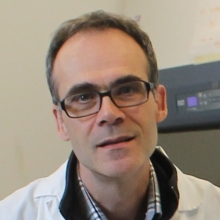Patrick Dion, PhD
Assistant Professor

Patrick Dion is an Assistant Professor in the Department of Neurology and Neurosurgery at the Montreal Neurological Institute. He obtained his M.Sc. (1987-1989) and Ph.D. (1990-1995) at Université de Sherbrooke (Sherbrooke, Canada) and Université de Montréal (Montreal, Canada), respectively, where he studied mechanisms of oncoviral cell transformation and the mutagenic specificity of alkylating agents at specific regions of the genome. His Postdoctoral research was carried out at the Hospital for Sick Children of Toronto (Toronto, Canada) (1995-96) and later in the Department of Centre for Neuroscience Research of McGill University (Montreal, Canada) (2014-2016). Prior to his move to the Neuro, in 2013, he was a Professor (Research) in the Department of Pathology and Cell Biology of Université de Montréal (2012-2015). Dion is interested in the identification of novel genetic risk factors in a range of neurological conditions (amyotrophic lateral sclerosis, essential tremor, restless legs syndrome) as well as into the characterization of the underlying pathogenic events associated with these risk factors. His examinations of the nuclear pore component, Gle1, in ALS opened the door to a range of examination of nuclear-cytoplasmic export defect where Gle1 is mislocalized.
Neurodegenerative disorders
Catoire et al. A direct interaction between two Restless Legs Syndrome predisposing genes: MEIS1 and SKOR1. Sci Rep. (in press) 2018
Müller SH, et al. Genome-wide association study in essential tremor identifies three new loci. Brain. 2016 Dec;139(Pt 12):3163-3169. PMID: 27797806.
Zhou S, et al. RNF213 Is Associated with Intracranial Aneurysms in the French-Canadian Population. Am J Hum Genet. 2016 Nov 3;99(5):1072-1085. PMID: 27745834.
Girard SL, et al. Paternal Age Explains a Major Portion of De Novo Germline Mutation Rate Variability in Healthy Individuals. PLoS One. 2016 Oct 10;11(10):e0164212. PMID: 27723766.
Kenna KP, et al. NEK1 variants confer susceptibility to amyotrophic lateral sclerosis. Nat Genet. 2016 Sep;48(9):1037-42. PMID: 27455347.
Gan-Or Z ,et al. Mutations in CAPN1 Cause Autosomal-Recessive Hereditary Spastic Paraplegia. Am J Hum Genet. 2016 May 5;98(5):1038-1046. PMID: 27153400.
Therrien M, Dion PA, Rouleau GA. ALS: Recent Developments from Genetics Studies. Curr Neurol Neurosci Rep. 2016 Jun;16(6):59. PMID: 27113253.
Williams KL, et al. CCNF mutations in amyotrophic lateral sclerosis and frontotemporal dementia. Nat Commun. 2016 Apr 15;7:11253. PMID: 27080313.
Ambalavanan A, et al. De novo variants in sporadic cases of childhood onset schizophrenia. Eur J Hum Genet. 2016 Jun;24(6):944-8. PMID: 26508570.
Cirulli ET, et al. Exome sequencing in amyotrophic lateral sclerosis identifies risk genes and pathways. Science. 2015 Mar 27;347(6229):1436-41. PMID: 25700176.
Paré B, et al. Early detection of structural abnormalities and cytoplasmic accumulation of TDP-43 in tissue-engineered skins derived from ALS patients. Acta Neuropathol Commun. 2015 Jan 31;3:5. PMID: 25637145.
Kaneb HM, et al. Deleterious mutations in the essential mRNA metabolism factor, hGle1, in amyotrophic lateral sclerosis. Hum Mol Genet. 2015 Mar 1;24(5):1363-73. PMID: 25343993.
Leblond CS, et al. Dissection of genetic factors associated with amyotrophic lateral sclerosis. Exp Neurol. 2014 Dec;262 Pt B:91-101. PMID: 24780888.
Therrien M, et al. Deletion of C9ORF72 results in motor neuron degeneration and stress sensitivity in C. elegans. PLoS One. 2013 Dec 12;8(12):e83450. PMID: 24349511.
Daoud H, et al. C9orf72 hexanucleotide repeat expansions as the causative mutation for chromosome 9p21-linked amyotrophic lateral sclerosis and frontotemporal dementia. Arch Neurol. 2012 Sep;69(9):1159-63. PMID: 22964911.
Bourassa CV, et al. VAMP1 mutation causes dominant hereditary spastic ataxia in Newfoundland families. Am J Hum Genet. 2012 Sep 7;91(3):548-52. PMID: 22958904.
Merner ND, et al. Exome sequencing identifies FUS mutations as a cause of essential tremor. Am J Hum Genet. 2012 Aug 10;91(2):313-9. PMID: 22863194.
Stochmanski SJ, et al. Expanded ATXN3 frameshifting events are toxic in Drosophila and mammalian neuron models. Hum Mol Genet. 2012 May 15;21(10):2211-8. PMID: 22337953.
Rivière JB, et al. KIF1A, an axonal transporter of synaptic vesicles, is mutated in hereditary sensory and autonomic neuropathy type 2. Am J Hum Genet. 2011 Aug 12;89(2):219-30. PMID: 21820098.
Girard SL, et al. Increased exonic de novo mutation rate in individuals with schizophrenia. Nat Genet. 2011 Jul 10;43(9):860-3. PMID: 21743468.
Catoire H, et al. Restless legs syndrome-associated MEIS1 risk variant influences iron homeostasis. Ann Neurol. 2011 Jul;70(1):170-5. PMID: 21710629.
Srour M, et al. Mutations in DCC cause congenital mirror movements. Science. 2010 Apr 30;328(5978):592. PMID: 20431009.
Dion PA, et al. Genetics of motor neuron disorders: new insights into pathogenic mechanisms. Nat Rev Genet. 2009 Nov;10(11):769-82. PMID: 19823194.
Shekarabi M, et al. Mutations in the nervous system--specific HSN2 exon of WNK1 cause hereditary sensory neuropathy type II. J Clin Invest. 2008 Jul;118(7):2496-505. PMID: 18521183.
Kabashi E, et al. TARDBP mutations in individuals with sporadic and familial amyotrophic lateral sclerosis. Nat Genet. 2008 May;40(5):572-4. PMID: 18372902.
Kabashi E, et al. Oxidized/misfolded superoxide dismutase-1: the cause of all amyotrophic lateral sclerosis? Ann Neurol. 2007 Dec;62(6):553-9. PMID: 18074357.
Gros-Louis F, et al. Mutations in SYNE1 lead to a newly discovered form of autosomal recessive cerebellar ataxia. Nat Genet. 2007 Jan;39(1):80-5. PMID: 17159980.
Dion P, et al. Transgenic expression of an expanded (GCG)13 repeat PABPN1 leads to weakness and coordination defects in mice. Neurobiol Dis. 2005 Apr;18(3):528-36. PMID: 15755680.
Gaspar C, et al. CAG tract of MJD-1 may be prone to frameshifts causing polyalanine accumulation. Hum Mol Genet. 2000 Aug 12;9(13):1957-66. PMID: 10942424.